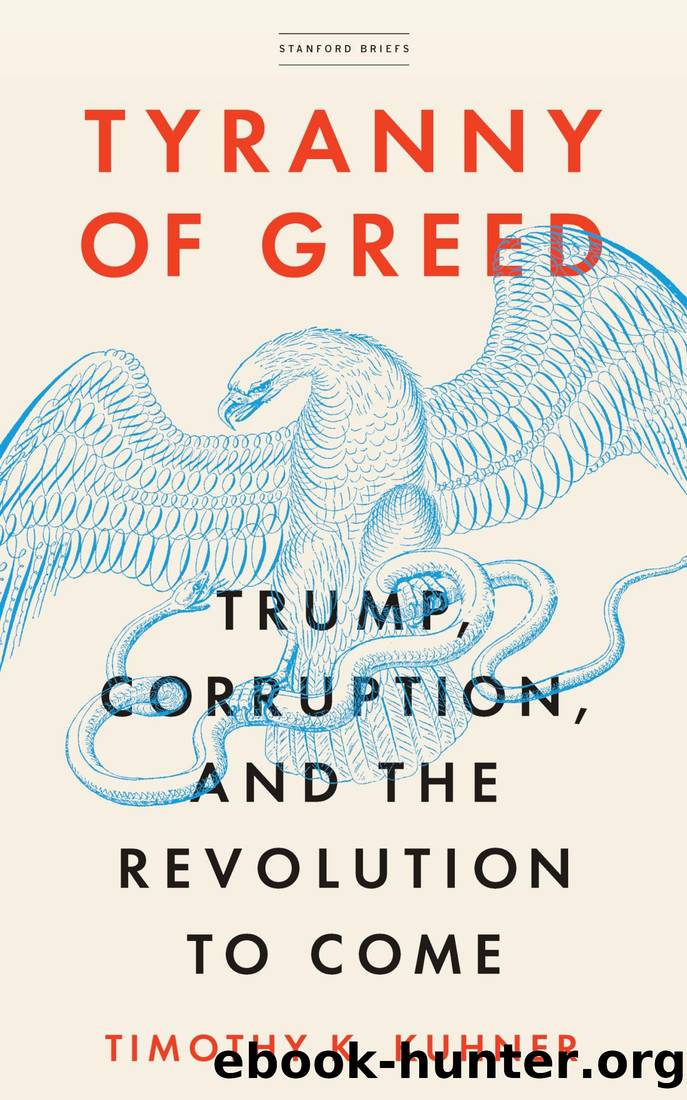Tyranny of Greed: Trump, Corruption, and the Revolution to Come by Timothy K. Kuhner

Author:Timothy K. Kuhner [Kuhner, Timothy K.]
Language: eng
Format: azw3, mobi
Tags: Political Ideologies, Government, Federal, Constitutional, Law, General, United States, American Government, Corruption & Misconduct, Political Science, Capitalism, History
ISBN: 9781503608504
Publisher: Stanford Briefs
Published: 2020-01-15T02:43:10.224392+00:00
89
The irony, however, is that Trump and the Republican leadership across the country were well ahead of Hillary in identifying their own basket of deplorables; and unlike her, they succeeded in excluding them from the political process. That brings us to another form of corruption that contributed to Trumpâs victory.
In 2008, Obama won Michigan, Wisconsin, Pennsylvania, plus Florida, North Carolina, and Ohio. In 2012, he won them all minus North Carolina. The emergence of a viable, progressive black candidate forced modern Republicans to relearn what past defenders of white, wealthy, landowner privilege had always known. If you canât restrict the participation of minorities and the disaffected poor, Republican victories will become ever more difficult to engineer. The criminal levels of gerrymandering that maintained socioeconomic and racialized patterns of political exclusion in state legislatures and Congress have no efficacy when it comes to the presidency. And so, after Obamaâs 2008 victory, Republicans doubled down on the old strategy of restricting voting rights.
Seven of the eleven states with the highest African American turnout in Obamaâs first election passed laws that made it more difficult to vote. Nine of the twelve states with the greatest Hispanic population growth since 2010 enacted new restrictions.40 And after Obama prevailed in 2012, the five Republican justices of the Supreme Court joined the political exclusion effort in Shelby County v. Holder.
90
T Y R A N N Y O F G R E E D
Their majority opinion struck down the federal preclearance requirements contained in Section 5 of the Voting Rights Act.41 Pursuant to Section 5, states with the most egregious histories of voter suppression were forced to seek the federal governmentâs permission prior to changing their election procedures. That provision protected minoritiesâ right to vote for nearly 50 years until Chief Justice Robertsâs majority opinion announced, effectively, that racism was over.
The court correctly noted that âvoter registration and turnout numbers in the covered States have risen dramaticallyâ since the preclearance provision had gone into effect.42 But, rather than evidence of the beneficial effects of preclearance requirements, the Republican justices considered this evidence of discriminatory effectâdiscrimination against states that had cleaned up their acts, a constitutional violation of their equal sovereignty by a vindictive federal government.
The same day the Shelby County majority opinion was published, Texas moved forward with a voter ID law that had been blocked by the preclearance section of the act just the year before. In short time, 8 of the other 15 states monitored most closely because of their histories of racist laws followed Texasâs lead.43 Overall, 18 of the 22 states that passed restrictive voting measures since 2012 did so through lawmaking bodies controlled by Republicans.44
But hindsight isnât necessary to shed critical light on the decision. In the year preceding Obamaâs reelection, 180 or more restrictive voting bills cropped up in 41 states. And
M A M M O N F O R P R E S I D E N T
Download
Tyranny of Greed: Trump, Corruption, and the Revolution to Come by Timothy K. Kuhner.mobi
This site does not store any files on its server. We only index and link to content provided by other sites. Please contact the content providers to delete copyright contents if any and email us, we'll remove relevant links or contents immediately.
| Antitrust | Civil Law |
| Emigration & Immigration | Federal Jurisdiction |
| Housing & Urban Development | Indigenous Peoples |
| Land Use | Public |
| Public Contract | Public Utilities |
| Urban, State & Local Government |
Killers of the Flower Moon by David Grann(3251)
Machine Learning at Scale with H2O by Gregory Keys | David Whiting(2298)
Will by Will Smith(2047)
Guns, Germs and Steel by Diamond Jared(1888)
Borders by unknow(1788)
The Room Where It Happened by John Bolton;(1722)
The Color of Law by Richard Rothstein(1576)
Once Upon a Broken Heart by Stephanie Garber(1500)
Water Rights and the Environment in the United States by John Burch(1414)
Friends, Lovers, and the Big Terrible Thing by Matthew Perry(1336)
Examples & Explanations: Administrative Law by William F. Funk & Richard H. Seamon(1327)
A Short History of War by Jeremy Black(1301)
The Strength In Our Scars by Bianca Sparacino(1258)
HBR's 10 Must Reads 2022 by Harvard Business Review(1257)
Pharmacy Practice and The Law by Richard Abood(1255)
That Every Man Be Armed by Stephen P. Halbrook(1238)
The Guarded Gate by Daniel Okrent(1220)
515945210 by Unknown(1211)
Injustices by Ian Millhiser(1199)
